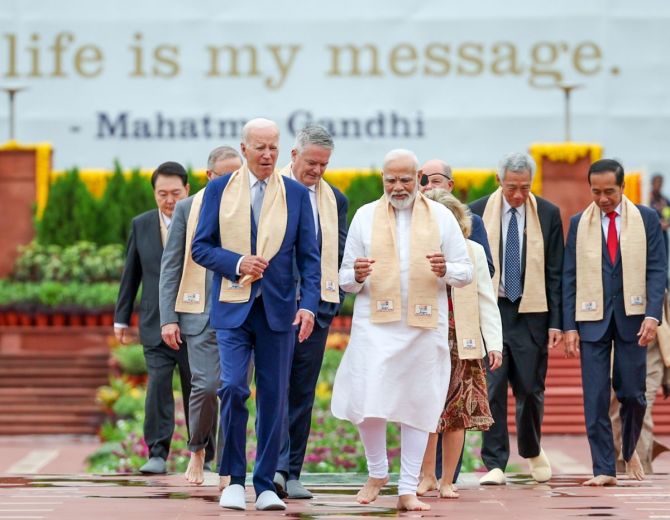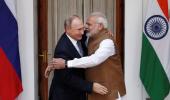The scaling up of the India-US strategic partnership to the level of non-NATO ally with defence deals, sharing and transfer of defence technology, interoperability, joint collaboration and joint production of defence equipment has exacerbated Moscow's anxiety, notes Rup Narayan Das.

At a time when some countries in the world, including in South Asia, are passing through an exhilarating election process, the complex triangular relationship among India-Russia-USA is echoing some murmur in subdued voices.
While in the sub-continent India will go to the polls in a few weeks from now, in Bangladesh the ruling party returned to power with the Opposition boycotting the elections, Pakistan has chosen a coalition government; Russia will go to the polls this month and the USA in November.
Be that as it may, the election outcome is not going to radically alter the strategic equation between and among major stakeholders in the theatre of geo-politics.
What warrants attention is the disquieting resonance in the complex India-Russia-USA strategic equation.
According to a recent news report in the media, the Russian ambassador to India Denis Alipov said that although India and Russia, who have scaled up their relationship to a 'special and privileged strategic partnership', enjoy reliable and time tested friendship, 'the US officials who come here do not hesitate to directly state that they are pursuing the goal of tearing New Delhi away from Moscow...,' suggesting Russia's peeve at the growing 'comprehensive global strategic partnership' between India and the USA.
What impels India to forge and deepen a defence and security partnership with the USA is the elephant in the room -- China, now a close ally of Russia.
The shibboleth of the Cold War and India's pursuit of non-alignment which then US secretary of state John Foster Dulles viewed as 'immoral' prevented, however, India from forging a close strategic relationship with the USA.
India's non-acquiescence of America's containment of Communism, after the outbreak of the Korean War in the early 1950s further created estrangement in India-US relations.
It was against this backdrop that tHE USA extended NATO in the Asian theatre by creating CENTO and SEATO with the support of Turkey and Pakistan which viewed India as an adversary.
Much to India's chagrin, the USA also moved resolutions in the United Nations against India on Kashmir and branded India as an aggressor in Goa.
It was only the Soviet veto in the UN Security Council that saved India from embarrassment.
All these developments cemented Indo-Soviet relations. The visit of Soviet leaders Nikolai Bulganin and Nikita Khrushchev to India in November 1955 boosted Indo-Soviet relations to greater heights.
Prime Minister Jawaharlal Nehru's socialist disposition and preference for a mixed economy in post independent India, however, provided ample space for the Soviet Union in key sectors of India's industrial economy like steel, heavy industries, oil refineries and pharmaceuticals.
In the post Nehru era, Indian prime ministers including Indira Gandhi and Rajiv Gandhi continued the same economic and political trajectory in the nation's alliance with the erstwhile USSR.
Prime Minister Narendra Modi too continues the time tested and trusted strategic partnership with Russia.
The outbreak of the India-China war in 1962 in which the Soviet Union maintained neutrality, triggered Nehru to seek arms and ammunition from the USA to face Chinese threats.
Thus, China has been a critical factor in tjhe India-USA strategic embrace couched in 'shared democratic values'.

The liberation struggle in East Pakistan which eventually gave birth to Bangladesh and India's involvement in the liberation struggle, however, temporarily interrupted India-US relations; and in turn further strengthened India's relationship with the USSR.
Ahead of the war, then prime minister Indira Gandhi signed the Friendship Treaty with Russia in 1971.
The growing proximity between India and Russia estranged India's ties with the USA which sent the Seventh Fleet to the Bay of Bengal to deter India from further advancement in the war.
A day after the war broke out between India and Pakistan in December 1971, then US president Richard Nixon and his national security adviser Henry Kissinger lifted America's arms ban on Pakistan.
India's victory in the war and the birth of Bangladesh as an independent nation and India's emergence as the unquestioned power in South Asia further created a hiatus between India and the USA.
It was against this backdrop of shifts of geo-politics that the USA attempted to repair its relationship with China by first facilitating China's admission to the United Nations by expelling Taiwan.
Earlier in 1969, the US through its interlocutor in Pakistan sent the message to Beijing that the US would stop patrolling in the Taiwan Strait as a signal to China to mend its relationship with China.
In 1969 the Sino-Soviet border dispute also broke out. It can be inferred that taking advantage of the Sino-Soviet schism, the USA attempted to reach out to China in the game of geo-strategic churning.
The US strategy was also aimed at countering India's rise in South Asia. The USA in the meanwhile took steps to repair its relationship with China.
First it facilitated China's admission to the United Nations in October 1971 and four months later Nixon and Henry Kissinger travelled to China and signed the historic Shanghai Communique in February 1972 which recognised Taiwan as a part of China.
The Shanghai Communique prepared the pitch for eventual US recognition of the People's Republic of China in January 1979.
While facilitating China's rise on the globe, the USA tried to contain India's rise in this period.
The final nail in the coffin of India-US estrangement was India's peaceful nuclear explosion in May 1974.
The USA imposed military and economic sanctions on India and also created the Nuclear Supplier Group to deny nuclear technology fuel fuel to India.
India's nuclear reactors had to suffer due to non availability of nuclear fuels.
The Soviet Union came to India's recue at this critical juncture. The USA further reinforced the sanctions on India in 1998 when India conducted a series of nuclear tests.
The disintegration or implosion of the erstwhile USSR in 1991 presided over by the late lamented Mikhail Gorbachev was yet another turning point in geo-politics which posed challenges for Indian foreign policy including India-Russia relations.
The end of the Cold War resulted in a unipolar world led by the USA.
In the interregnum until Vladimir Putin took reins of power in Russia in 2000, India-Russia relations underwent pangs of transition.
Putin's visit to India in 2000 consolidated the continuum of India-Russia relations.

The India-US rapprochement, which commenced with then US president Bill Clinton's visit to India in March 2000, however, aroused anxiety in Moscow.
The scaling up of the India-US strategic partnership to the level of non-NATO ally of the USA with defence deals, sharing and transfer of advance defence technology, interoperability, joint collaboration and joint production of defence equipment have further exacerbated Moscow's anxiety.
Well aware of the perils of putting all the eggs in one basket, New Delhi pursues the prudency of diversifying defence procurement and insistence on partner countries for transfer of technology, collaboration and joint production.
Defence procurements from Russia entails repair, spare parts and servicing.
India can hardly ignore Russian sensitivity. So it's a tightrope walk for India.
A summit meeting between Modi and Putin in all likelihood will be the first diplomatic outreach after India's general election.
The moral lesson of the story is the immoral conclusion that nations have no permanent friends or foes, only permanent interests. The only panacea is an Atmanirbhar Bharat.
Rup Narayan Das was a former senior fellow of the Manohar Parrikar Institute for Defence Studies and Analyses and also Indian Council of Social Science Research (ICSSR). Views expressed are personal.
Feature Presentation: Aslam Hunani/Rediff.com










